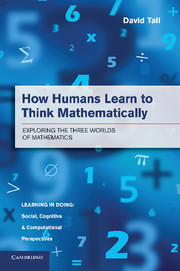Book contents
Summary
I have long been concerned with the struggle to make sense of mathematics and how it is taught and learnt in a world where a few find mathematics an enterprise of great power and beauty, many learn what to do without knowing why and many others find only anxiety and pain.
It has been my good fortune to interact with the teaching and learning of mathematics at every level from preschool to postgraduate research. As I reflected on these experiences and the insights of experts in a range of contexts, it became evident that what happens at each stage of learning is significantly affected by previous experience and has a significant effect on the development of each individual at later stages. This means that it is not sufficient to focus only on a particular level of teaching and learning, as learners at that level will already be affected by what they have met before, and what they learn now will affect future learning. This suggests the need for an overall framework for the development of mathematical thinking so that any individual participating in the enterprise may become aware of a fuller picture. This has the consequence that disputes between different viewpoints may be seen in a new revealing light.
- Type
- Chapter
- Information
- How Humans Learn to Think MathematicallyExploring the Three Worlds of Mathematics, pp. xiii - xviPublisher: Cambridge University PressPrint publication year: 2013

